Are Pistachios Healthy? We Asked a Dietitian
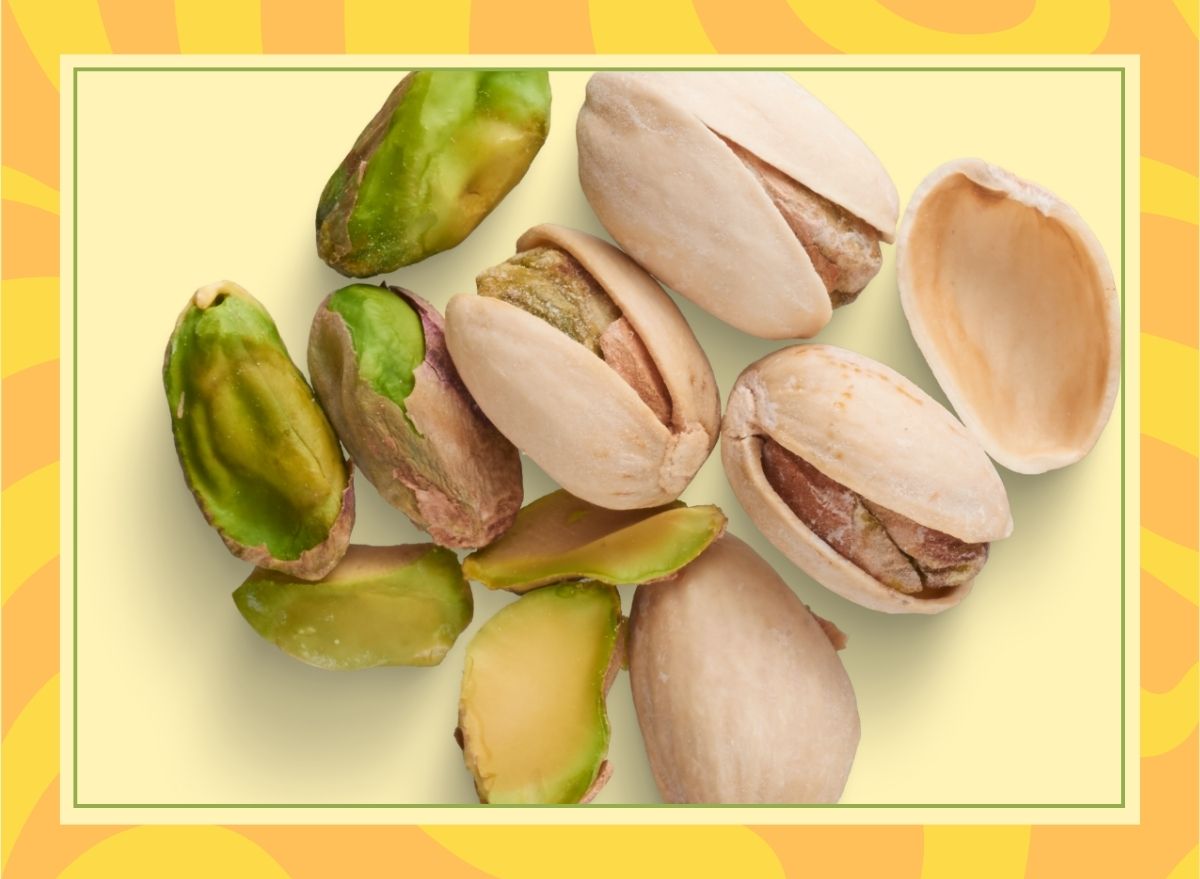
Humans have been eating pistachios for over 300,000 years, and their popularity shows no signs of waning. These small green tree nuts are beloved for their slightly sweet flavor, satisfying crunch, and impressive nutritional profile.
Historically enjoyed by ancient civilizations, pistachios have made their way into modern diets and are celebrated as versatile and nutritious foods. They’re routinely added to trail mixes, granolas, and snack bars, offering a convenient snack option. They’ve also made their way into baked goods like cookies and cakes, as well as savory dishes like pesto and salads. Plus, pistachio butter and milk have become popular alternatives for those seeking dairy-free milk options.
But are pistachios really healthy? In this article, we’ll explore the health benefits of pistachios. From weight loss to reducing heart disease risk, pistachios have many evidence-based advantages that make them worth incorporating into your snack rotation.
Nutritional Content of Pistachios
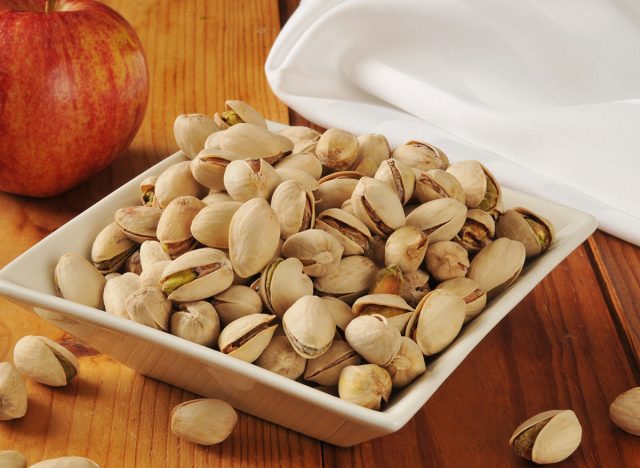
Calories: 160
Fat: 13 g (Saturated Fat: 1.5 g)
Sodium: 0 mg
Carbs: 8 g (Fiber: 3 g, Sugar: 2 g)
Protein: 6 g
Calcium: 30 mg (2%)
Iron: 1.1 mg (6%)
Potassium: 280 mg (6%)
Thiamin: 0.19 mg (15%)
Vitamin B6: 0.31 mg (20%)
Phosphorus: 130 mg (10%)
Magnesium: 30 mg (8%)
Copper: 0.36 mg (40%)
Manganese: 0.35 mg (15%)
% Daily Value (DV) is based on a 2,000-calorie diet.
If you choose salted pistachios, they add about 135 mg (6% DV) of sodium per one-quarter cup (one ounce) serving. The honey-roasted version only adds 1 mg of sugar and 90 mg (4% DV) of sodium per one-quarter cup serving.
Pistachios are high in micronutrients, especially thiamin (vitamin B1), vitamin B6, copper, and manganese.
Health Benefits
Pistachios have many potential health benefits. While they are calorie-dense due to their fat content, they are also high in protein, fiber, vitamins, and minerals and low in saturated fat, making them a healthy choice as part of a balanced diet.
Weight Loss and Blood Pressure Reduction
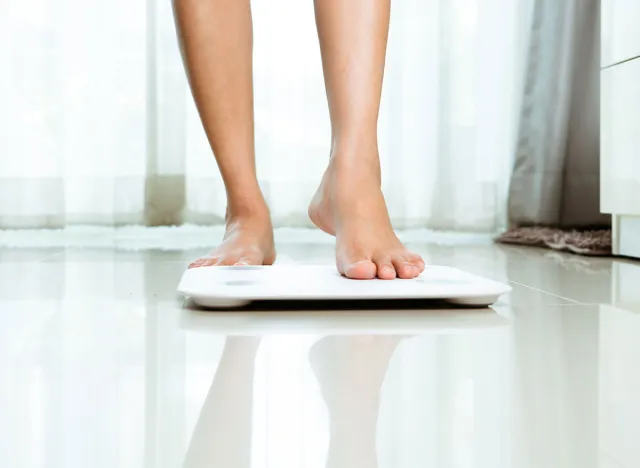
A 2020 study showed that eating 1.5 ounces of pistachios daily combined with a calorie-restricted diet was associated with significantly reduced blood pressure and body weight. Interestingly, the people eating pistachios in the study reported a lower intake of sweets compared to the control group. They also reported a lower intake of added fat. These results suggest that eating pistachios as part of a weight loss plan may improve overall diet quality.
Blood Sugar Control
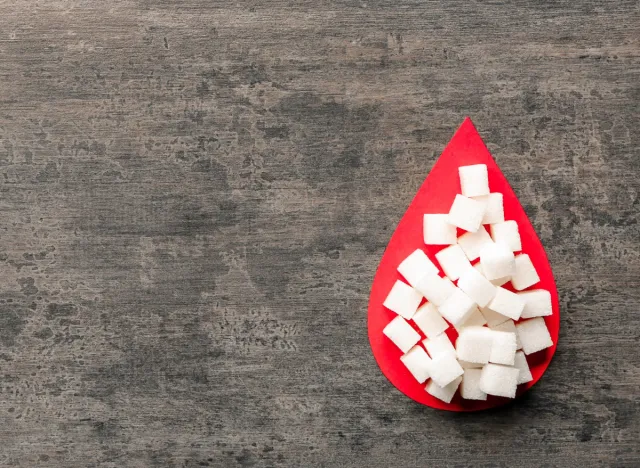
Eating pistachios may also benefit blood sugar control. A 2020 systematic review and meta-analysis found that eating pistachios was associated with significant reductions in fasting blood sugar and improvements in insulin sensitivity (how easily your body can respond to insulin, the hormone that tells your cells to take up glucose from the blood). Therefore, pistachios may be beneficial for preventing or treating type 2 diabetes when used alongside other diabetes treatments.
Improved Lipid Profiles
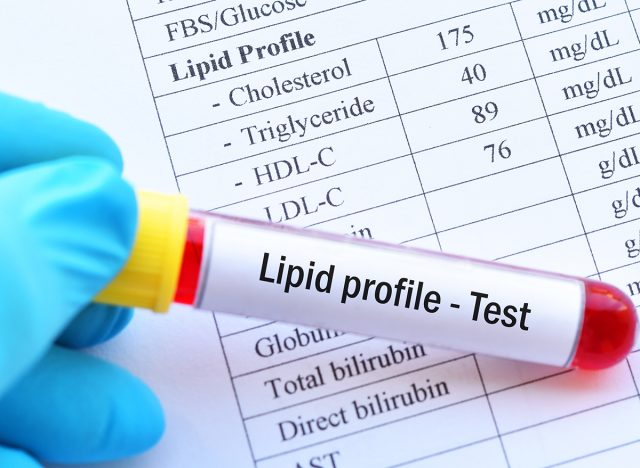
A 2023 systematic review and meta-analysis found that eating pistachios may positively impact lipid profiles (the fats in your blood, like cholesterol and triglycerides) and may protect against heart disease. Specifically, they found that eating pistachios was associated with significant reductions in total cholesterol, LDL (bad) cholesterol, and triglycerides. While larger studies are needed to confirm these results, this preliminary data suggests that pistachios could be part of a healthy diet to lower heart disease risk.
Improved Brain Function and Mood

Pistachios may also impact brain function and mood. A 2024 pilot study found that eating pistachios was associated with improved cognitive performance and mood in young overweight adults, in addition to reducing waist circumference, total cholesterol, LDL cholesterol, and triglycerides.
Positive Impact on the Gut Microbiota
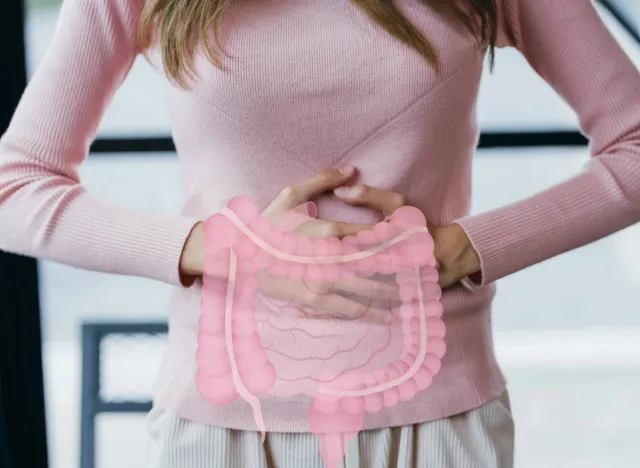
Finally, eating pistachios may positively impact the gut microbiota. A 2014 study found that people who ate 85 grams of pistachios daily for 18 days had an increase in beneficial gut bacteria compared to those who ate almonds during the study. It’s thought that pistachios have a prebiotic effect on the gut microbiota. Prebiotics are substances that promote the growth of good gut microbes. We could all benefit from added prebiotics to support a healthy gut microbiota, and pistachios may be the perfect way to get them.
Health Drawbacks
While pistachios have many health benefits, there are some potential drawbacks to be aware of.
They Have High Salt Content

While even salted pistachios contain a relatively low amount of sodium, the amount increases quickly if you eat more than a one-quarter-cup serving. Given the high palatability of salty foods, overeating and consuming more than one serving is possible, so try to be mindful of portion sizes while snacking.
Pistachios Are Calorie Dense
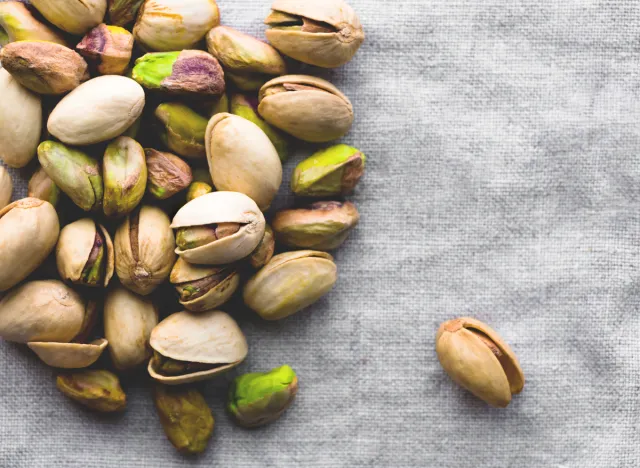
Additionally, pistachios are calorie-dense thanks to their high fat content. While the fats in pistachios are mostly heart-healthy mono- and polyunsaturated fats, eating large portions can contribute significantly to your daily calorie intake.
They’re Not Ideal for People with Kidney Disease
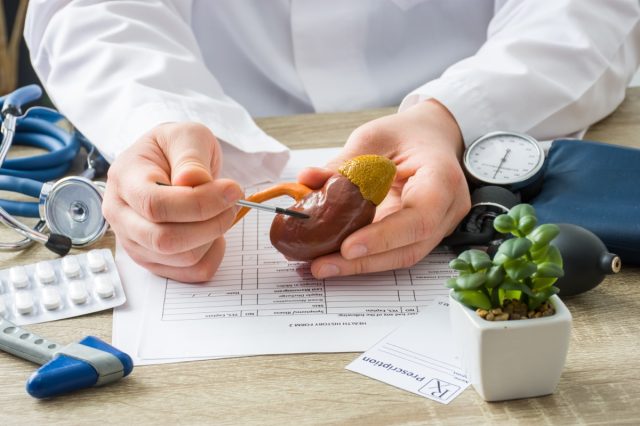
Pistachios also contain a large amount of phosphorus. While this isn’t an issue for most people, excessive phosphorus intake can cause issues for people with kidney disease.
Pistachios Are High in FODMAPs
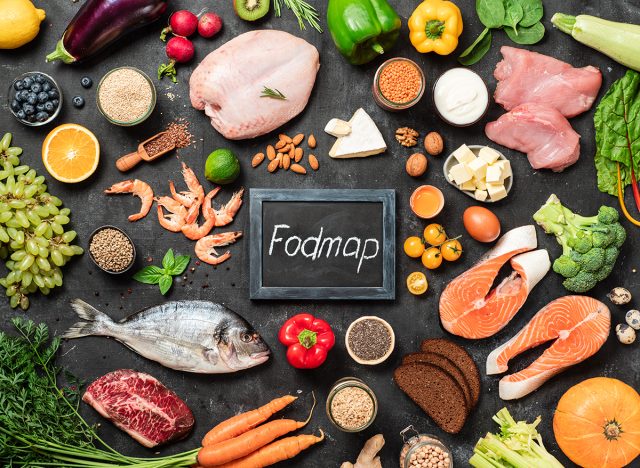
People with irritable bowel syndrome (IBS) may want to steer clear of pistachios, as they’re considered a high-FODMAP food. FODMAPs are types of carbohydrates that humans do not digest. Instead, they arrive at the large intestine intact, where they are fermented by the gut bacteria, leading to gas, bloating, and potentially changes in bowel habits.
Tree Nuts Have Allergy Risks
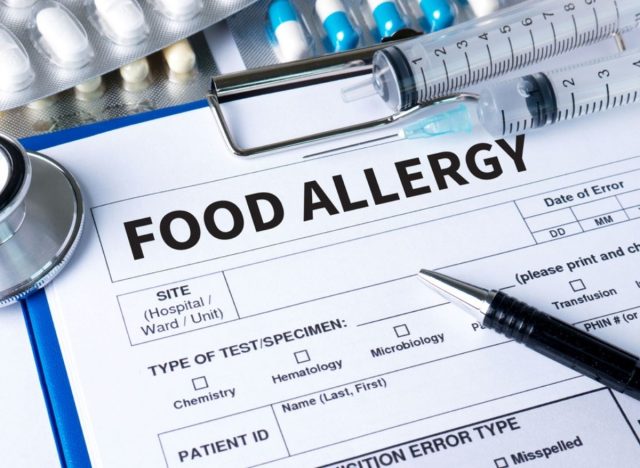
Pistachios are tree nuts. People with tree nut allergies should be cautious about eating them or eating any food that has come into contact with them, as they could cause a serious allergic reaction.
So, Are Pistachios Healthy?
Pistachios have many potential health benefits, including weight loss, reducing blood pressure, reducing fasting blood sugar, improving insulin sensitivity, improving lipid profiles, improving cognitive performance and mood, and positively impacting the gut microbiota.
There are many ways to incorporate pistachios into a healthy diet. Given their calorie density, it’s best to stick to a serving size of about one ounce (one-quarter of a cup). If you plan on eating more than a one-ounce serving, choose the unsalted version, as the salt content can add up quickly with larger portions of salted pistachios. You may also find it helpful to eat the shelled versions rather than unshelled ones, as they take longer to eat and may help with portion control.
Consider pre-portioning pistachios into small bags or containers for quick, grab-and-go snacks. Alternatively, add chopped pistachios to oatmeal, yogurt, or smoothie bowls for a nutrient boost at breakfast, or sprinkle them onto a salad for extra crunch.
- Source: https://www.ncbi.nlm.nih.gov/pmc/articles/PMC8747606/
- Source: https://www.ncbi.nlm.nih.gov/pmc/articles/PMC7400898/
- Source: https://pubmed.ncbi.nlm.nih.gov/32947760/
- Source: https://pubmed.ncbi.nlm.nih.gov/34933637/
- Source: https://pubmed.ncbi.nlm.nih.gov/38943918/
- Source: https://pubmed.ncbi.nlm.nih.gov/24642201/
- Source: https://pubmed.ncbi.nlm.nih.gov/32497904/
- Source: https://www.ncbi.nlm.nih.gov/pmc/articles/PMC10857121/









